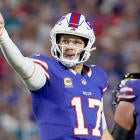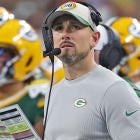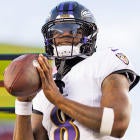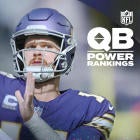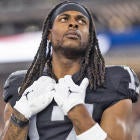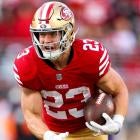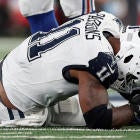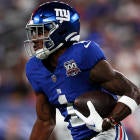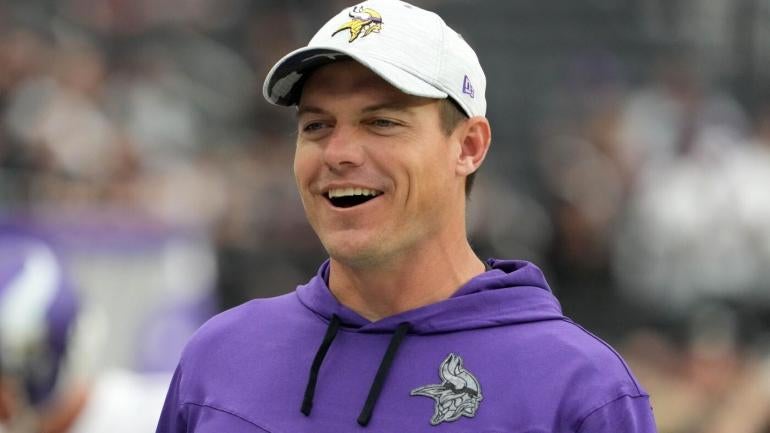
One of the early surprises of the 2024 NFL season has been the rebirth of quarterback Sam Darnold. After spending last year as a backup with the San Francisco 49ers, he signed with the Minnesota Vikings and has them off to a 3-0 start.
Darnold's eight passing touchdowns rank first in the NFL through three weeks, his 117.3 passer rating ranks second and his 8.4 yards per attempt rank fifth. He is just the fifth quarterback over the last 25 years to start 3-0 and throw eight passing touchdowns in his first three starts with a team. Two of the previous four quarterbacks won the Super Bowl that season.
It wasn't long ago where the former No. 3 overall pick of the New York Jets was regarded as a complete bust. Darnold went 13-25 with the Jets before being traded to the Carolina Panthers, then was cut loose after going 8-9 in Charlotte. Now, at 27-years-old, he's playing himself into a lucrative contract that will come from either the Vikings or another quarterback-needy team.
What happened for Darnold to turn the corner as a starting quarterback? His current situation has been a great help in his early-season success. Not only does Darnold get to throw to the best receiver in the NFL in Justin Jefferson, but he's also being guided by an underrated offensive mind in head coach Kevin O'Connell.
During a recent appearance on the "Rich Eisen Show," O'Connell discussed developing quarterbacks, and said that if a player struggles early in his career, it's the organization that is to blame.
"I just think as a whole, there's not enough emphasis put on the organization's role in the development of the position, meaning I believe that organizations fail young quarterbacks before young quarterbacks fail organizations," O'Connell said.
Even though he has the example of Darnold right in front of him, and former Panthers' No. 1 overall pick Bryce Young was benched just last week in Carolina, O'Connell said he didn't want to give a specific example of what he was talking about.
"Just overall 30,000-foot view, I think it's important to understand that every single one of these guys is on a journey. A very difficult journey," O'Connell said. "That they need the support, they need the teammates around them, they need the systems in place to ultimately try to maximize who they are and what their potential is because you're still drafting players off of potential. And then everything that happens from that moment to when that potential becomes a reality is really on the organization if you've got the right guy that you're bringing in.
"I do believe there's some times where things just don't work out, and then getting a chance to kinda wipe the slate clean and get a restart while still using your previous experiences to kinda shape how you're gonna work, why you're gonna work, why things are important to you, will only make guys better in the end and I think we've seen some examples of that in our league as well over the last few years."
#Vikings HC Kevin O’Connell on quarterback development:
— VikingzFanPage (@vikingzfanpage) September 27, 2024
“I believe organizations fail young quarterbacks before young quarterbacks fail organizations.”
🎥: @RichEisenShow pic.twitter.com/IcbwJedDwq
O'Connell is correct in saying that we've seen examples of QB rebounds recently. Apart from Darnold, Baker Mayfield is a quarterback who was awarded a multi-year contract this offseason after he bounced back with the Tampa Bay Buccaneers following short stints with the Panthers and Los Angeles Rams. Geno Smith of the Seattle Seahawks won Comeback Player of the Year in 2022 and earned a contract extension after his career year following the Russell Wilson trade. Like Mayfield, Smith played for three different teams before finding his long-term home.
How about Malik Willis? The former third-round pick was virtually thrown away by the Tennessee Titans, but immediately stepped into the starting lineup for the Green Bay Packers and led his new team to two straight victories while playing the best football of his NFL career.
What do O'Connell's comments mean for some of the young quarterbacks who are struggling right now? Could Young find his footing if he were traded to a team like the Miami Dolphins? Could Will Levis or Daniel Jones thrive with a change of scenery?
The bottom line is that we've learned you can't rule out young quarterbacks just because they aren't immediately successful. And O'Connell says it's on the organizations if their investments prove fruitful or not.









